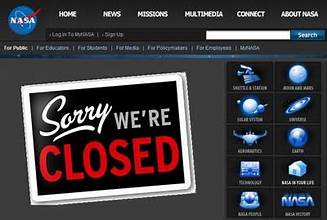
Key Developments
- Over 15,000 NASA employees have been furloughed under the government shutdown, leaving critical missions, including 3I/ATLAS monitoring, in limbo.
- A furloughed NASA worker tells USA Herald she’s “terrified” about feeding her family because she’s ineligible for unemployment.
- As the shutdown drags on, questions rise over whether Congress, the President—or even the insurance sector—can bridge the widening financial gap.
MOUNTAIN VIEW, CA – The silence echoing through NASA’s corridors is more than symbolic. With the federal shutdown now deep into its second week, roughly 15,094 NASA employees—about 80 percent of the agency’s workforce—have been ordered to stay home. Only 3,100 “excepted” workers remain active, tasked with safeguarding life-support systems aboard the International Space Station and maintaining select satellite operations.
That means more than half of the world’s most advanced scientific and security infrastructure sits paused. From planetary observation to national-defense data sharing, the shutdown’s ripple is far-reaching. Even NASA’s real-time analysis of 3I/ATLAS, the interstellar object racing through our solar system, has been temporarily frozen. Telescopes continue capturing data through partner observatories, but with furloughs at NASA’s Jet Propulsion Laboratory and Goddard Space Flight Center, much of the processing and dissemination is halted.
“3I/ATLAS doesn’t wait for politics,” a senior aerospace contractor told USA Herald. “We have a rare celestial event occurring right now, and in many respects, it’s being missed in real time.”
For the human side of the story, I spoke with a furloughed NASA employee who asked to remain anonymous. Her voice trembled as she described her family’s situation:
“I’m terrified for my family’s financial situation. I can’t collect unemployment because I’m still technically under federal employment, and I can’t get another job while under contract. We live paycheck to paycheck, and the longer this goes on, the less we have for food, gas, or rent.”
Her story is not unique. Tens of thousands of federal employees are legally barred from outside employment during a furlough. The Government Employee Fair Treatment Act of 2019 is supposed to guarantee back pay—but not relief in the meantime. Retroactive checks won’t fill today’s empty refrigerators.
From a constitutional perspective, the law is clear: Congress controls appropriations under Article I, Section 9, and the President cannot authorize spending without those funds. When both branches stalemate, the government stops paying its employees, regardless of how critical their functions may be. NASA’s operations plan explicitly notes that only “activities necessary for the protection of life and property” continue—an interpretation that leaves planetary defense, research, and ongoing observation projects in a gray area.
Legal experts suggest that a prolonged shutdown could raise due-process and contract-interference questions, especially if workers’ livelihoods are endangered for political leverage. Some unions have explored lawsuits, though past courts have largely upheld the legality of furloughs under the Antideficiency Act.
Still, constitutional legality does not equal moral legitimacy. The shutdown’s national-security dimension is glaring. NASA’s Earth and planetary observation data feed directly into systems used by the Department of Defense, FEMA, and NOAA. When those data streams slow or stop, predictive capabilities for threats—from solar storms to foreign satellite maneuvers—could be compromised.
The political impasse has ignited conversations about private-sector intervention. President Donald Trump said during a recent press briefing that a wealthy acquaintance offered to fund military paychecks if the government could not. That comment underscores a broader point: the means exist for America’s corporate elite—particularly those posting record profits—to step in.
Could the insurance industry fill the gap? Conceptually, yes. With combined profits exceeding $100 billion annually, major insurers could implement short-term financial-aid or loan programs for furloughed federal workers, much like catastrophe assistance after natural disasters. A “Federal Workforce Relief Fund,” backed by insurers and administered through payroll verification, could deliver advances repayable once back pay arrives.
Such a mechanism would serve as a goodwill gesture and a strategic investment in stability. Insurance companies already model correlated risks—from hurricanes to cyber-attacks—so adding “government shutdown risk” to their portfolio would not be far-fetched. The only missing ingredient is willpower.
As the anonymous NASA employee put it, “They insure billion-dollar rockets and multi-national corporations. Why can’t they insure us?”
Beyond the financial toll lies America’s reputation for scientific leadership. The pause in data processing, coupled with global coverage gaps, could hand an observational advantage to international rivals like China, who continued tracking 3I/ATLAS uninterrupted, while U.S. systems idle. In an era when national power is measured in data and discovery, the loss of even a few weeks of research may cost years of progress.
Meanwhile, the public—whose taxes fund NASA—waits for updates on the mysterious visitor from beyond our solar system. The shutdown has silenced mission updates, public briefings, and educational outreach. The agency’s website warns, “Due to the lapse in federal funding, this website is not being updated.” For a generation raised on space exploration, the message is chilling: America’s gaze toward the stars can be shut off with a pen stroke.
What’s Next
Congress must pass a continuing resolution or appropriations bill to reopen the government. Once enacted, NASA will recall all furloughed employees and issue retroactive pay under the Fair Treatment Act. But the backlog—scientific, operational, and personal—will linger. The furlough has disrupted launch preparations, grant schedules, and contractor relationships.
If private insurers, philanthropic foundations, or billionaires wish to prove that civic duty extends beyond profit, now is their moment. The insurance industry could pioneer “shutdown interruption coverage,” much as it created pandemic and terrorism lines after 9/11.
Until then, the only certainty is uncertainty—and 3I/ATLAS will continue its silent trajectory past a distracted planet


